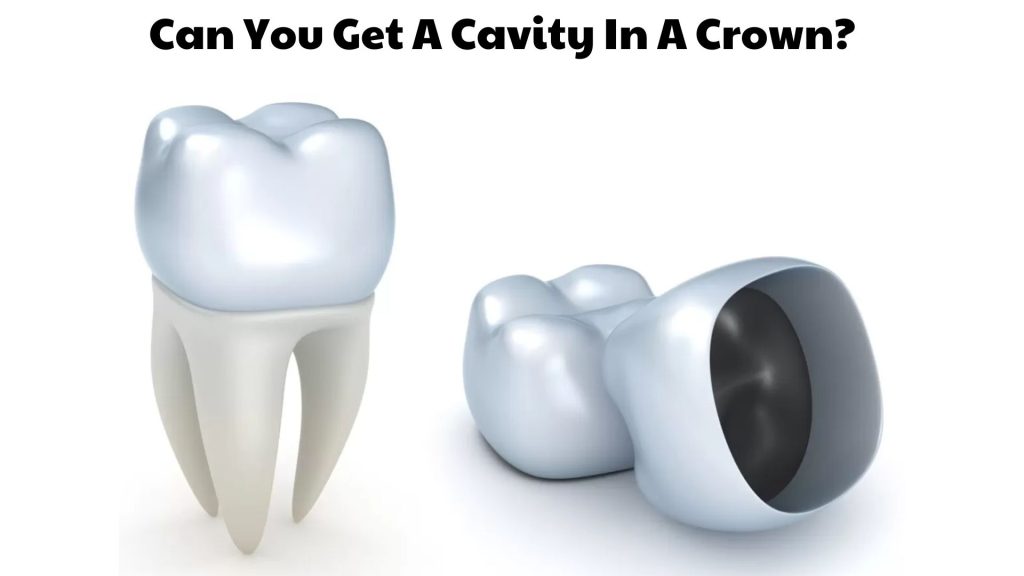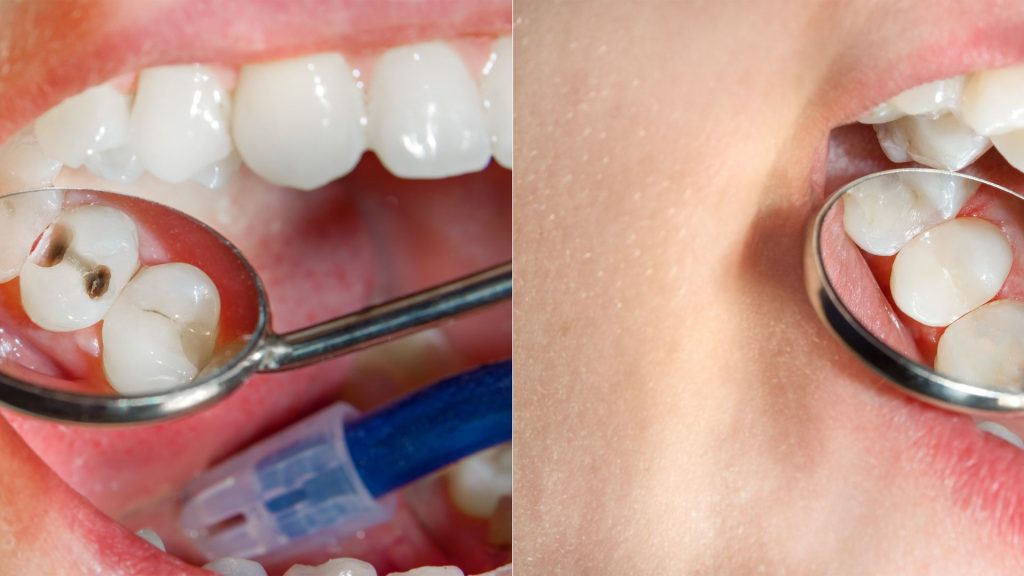Can you get a cavity in a crown? Yes, crowns may have cavities. While dental crowns are robust and preserve the tooth structure, they may deteriorate. For people contemplating dental veneers to enhance tooth attractiveness and health, this is a crucial issue. This post will answer this topic and discuss porcelain crown tooth decay and how to preserve your dental health.
Can You Get A Cavity In A Crown?


Yes, porcelain crowns may have cavities. Although porcelain teeth are stronger and more resistant to decay than actual teeth, they may nevertheless deteriorate in rare circumstances. Here are some possible explanations:
Causes Of Tooth Decay In A Crown
Dental professionals constantly wonder, “Is it possible to get cavities in the porcelain crown?” Tooth decay may affect porcelain veneers, which are typically thought to preserve natural teeth. Understanding these elements can help you safeguard and maintain your porcelain teeth:
- Cleft or gap in a crown: Gaps in porcelain teeth allow germs and plaque to penetrate and cause tooth decay. Due to improper crown installation or wear and tear, this generally occurs.
- Sealing: If the porcelain tooth layer and natural tooth are not adequately sealed, gaps or abnormalities may form. This allows germs to grow and cause tooth decay.
- No routine dental care: If you don’t see your dentist often to inspect and clean the crown, issues may go unnoticed.
- Pressure and abrasion: Chewing hard sweets, smashing pebbles, or improperly scrubbing hard porcelain veneers may cause strain and wear.
- Unbalanced oral environment: An imbalanced oral environment may foster tooth decay-causing microorganisms. Smoking, mouth pH fluctuations, and other oral health issues might cause this.
In conclusion, regular dental care, a balanced diet, and your dentist’s advice are the best ways to prevent cavities in porcelain teeth. Discuss porcelain tooth issues with your dentist for guidance and an oral health exam.
Indications Of Dental Decay In The Crown
It might be hard to recognize dental decay in porcelain teeth, but if you see these signs, you may have a problem:
- Pain or stinging: An unpleasant or stinging feeling is a frequent indicator of dental decay. Eating anything too hot, too cold, too sweet, or biting down too forcefully may all cause pain.
- Swollen and bleeding gums: Infection of the gums, brought on by tooth decay, may cause them to swell and bleed more often.
- Changes in the color of porcelain teeth: If the porcelain tooth layer develops decay, it may be black or stained white or brown.
- Unpleasant breath: Cavities in porcelain teeth increase oral germs, causing poor smell.
- Loss of stability: The porcelain crown may be loose or out of position due to tooth decay or another issue.
Thus, these symptoms may vary and not always be present. If you suspect porcelain tooth cavities, see your dentist right away. Early detection and treatment of tooth decay helps safeguard porcelain teeth and limit its development.
How to Cure Porcelain Tooth Decay?
Cavities in porcelain veneers are often addressed using a number of professional dental treatments and procedures. Some of the most prominent treatments for this ailment are as follows:
- Removing cavities: The dentist will drill and clean the porcelain tooth layer to eliminate cavities before treating it.
- Porcelain veneer repair: After decay removal, the crown may require restoration. To maintain and repair porcelain, dentists might use fresh porcelain material or an optimal compound.
- Replacing porcelain tooth layer: If the porcelain tooth layer is broken or decayed, it may need to be replaced.
- Use appropriate oral care products: Your dentist may offer a specific oral care solution or fluoride mouthwash to maintain and strengthen porcelain teeth’ mineral layer.
- Perform periodic check-ups: To prevent issues from recurring, porcelain teeth should be checked regularly following treatment.
Way To Avoid Crown Tooth Decay?


To prevent dental cavities in the porcelain layer, regular dental maintenance and the use of suitable oral care practices are essential. You may safeguard your beautiful whites by doing the following:
- Daily oral care: Use a gentle toothbrush and fluoride toothpaste to clean your teeth twice daily. Brush your teeth for a full 2 minutes, twice a day.
- Use floss and mouthwash: Flossing between your teeth and using an alcohol-free mouthwash will help you maintain a healthy, bacteria-free mouth.
- Healthy diet: Avoid sugary and acidic foods and drinks, which may harm tooth enamel. Prioritise mineral- and fiber-rich diets.
- Avoid biting hard objects: Don’t eat rocks, ballpoint pens, or nails. As a consequence, the teeth’s protective enamel may be pushed and worn away.
- Periodic check-ups: Check your porcelain teeth and dental health with your dentist often. Routine checkups discover and address tooth issues early.
- Use oral care products containing fluoride: This product protects porcelain from deterioration and strengthens tooth enamel.
Prevention is essential since porcelain teeth cannot be fixed after they have been broken. Keeping your porcelain crown and teeth in excellent condition requires regular dental examinations and cleanings.
When Should You See A Dentist?
If you have a cavity in your porcelain crown, you should know how long you may wait to visit a dentist. Read on if you’re interested in the optimal time to schedule a dental appointment.
- Pain or soreness: Pain or stinging in your mouth, particularly while eating or drinking, indicates dental decay. Visit a dentist promptly for assessment and treatment.
- With food and drink sensitivities: Tooth decay is indicated by sensitivity to hot, cold, acidic, or sweet meals and beverages. Avoid this issue by seeing the dentist for a checkup and treatment suggestions.
- When changing the porcelain tooth layer color: Dark white or brown stains on the porcelain tooth covering may indicate dental decay. See your dentist for details and a checkup.
Remember, seeing your dentist on a regular basis and as soon as you notice indications of tooth decay in the porcelain tooth layer is critical to preventing the issue from worsening and protecting your health.
Conclude
“Are porcelain veneers prone to cavities?” This is an important issue for porcelain tooth owners and prospective purchasers. Since Spring Orchid Dental has placed porcelain veneers on your mouth, you may want to protect it and maintain good dental health.
At Spring Orchid Dental Clinic, porcelain teeth add beauty and confidence to your smile and guarantee their quality. Although porcelain teeth are tougher and more decay-resistant than real teeth, frequent maintenance and exams are needed to keep the porcelain crown in good condition.
All patients get superior dental treatments and competent guidance from Spring Orchid Dental. Our team helps you preserve and safeguard your porcelain teeth while enhancing your smile. We’ll teach you how to avoid crown cavities and maintain good dental health.
FAQs
Is Crown Tooth Decay Treatable At Home?
No, porcelain teeth cannot be fixed using traditional home treatments. because they are constructed of superior ceramic. So only trained dentists should do specific treatments like filling cavities and replacing porcelain.
So, contact your dentist promptly if you suspect a crown cavity. Self-treating porcelain tooth cavities is inefficient and might weaken and destroy the ceramic tooth covering. oral professionals should be seen to preserve your oral health and beauty.
Extraction of Decaying Porcelain Teeth?
Porcelain crowns are intended to preserve and strengthen the underlying tooth below, thus tooth extraction is typically unnecessary in the event of a cavity.
Remember to minimize additional damage to the porcelain coating and avoid extraction while treating porcelain tooth decay. Protect your health by arranging a dental visit as soon as possible and following your post-op care plan.
Is Porcelain Tooth Caries More Risky For Seniors?
Porcelain tooth decay in children or the elderly is the same. If not addressed quickly, it may cause pain, inflammation, and the need to replace the porcelain crown, as well as develop more serious dental disorders.
Many reasons might induce senior porcelain tooth decay, which can be dangerous. Consider these factors:
- Reduced resistance: Due to weakened immune systems, older persons may have more dental issues and be harder to treat.
- Lifestyle changes: Lifestyle and dietary modifications like medication or softer meals may increase senior cavities.
- Overall health: Seniors’ dental health is affected by their overall health. Diabetes and cardiovascular disease are two chronic illnesses that may cause tooth damage.
Therefore, frequent dental examinations and oral hygiene are necessary regardless of age to avoid cavities in porcelain teeth.





